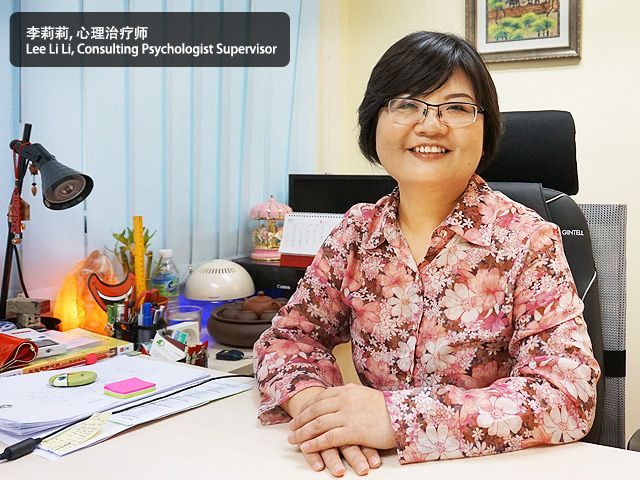 The consulting psychologist supervisor, Ms. Lee Li Li, shares about the topic "How Learning Disabilities may affect your child's future?" at 8:00a.m. at Melody FM Morning Boss (Live) on March 30, 2017 (Thursday).
The consulting psychologist supervisor, Ms. Lee Li Li, shares about the topic "How Learning Disabilities may affect your child's future?" at 8:00a.m. at Melody FM Morning Boss (Live) on March 30, 2017 (Thursday).Prevalence of Learning Disabilities in Malaysia
Ms. Lee Li Li shares that there is statistic of 20% of the school populations in Malaysia are children with learning disability. Nevertheless, Ms. Lee Li Li believes that the statistic could possibly be higher than the statistic reported because the statistic found is merely based on the pool of children who registered as Orang Kurang Upaya (OKU). There could be more of the children who are not OKU, are actually with learning disabilities.
The Indicators of Learning Disabilities:
- Look at a passage but could not read it out.
- Difficulty in remembering
- Unable to answer questions related to academic
- Poor in words recognition
- Good in auditory attention
How to distinguish Learning Disabilities?
 1. Intelligent Quotient (IQ) based on Wechsler Intelligence Test
1. Intelligent Quotient (IQ) based on Wechsler Intelligence Test- Child with learning disabilities generally has an average IQ of 70 - 75, which is similar to a normal child. Certain child with learning disabilities even has an IQ higher than average.
- A child with IQ lower than 70 might be categorized as lower IQ or mental retardation rather than of learning disabilities.
2. Academic Performance
- Child with learning disabilities could shows poor academic performance. This could be caused by the lack of attention or also due to hyperactivity which lead to the child could not sit still to learn.
 3. Learning Process
3. Learning Process- Child with learning disabilities also struggles to learn due to his or her processing ability which resulting the child’s inability to associate the learning materials. Hence, he or she encounters difficulty to remember the lessons or content that was thought repetitively.
Causes of Learning Disabilities
Learning disabilities comes in two forms - through genetics and through external stimuli
 1. Genetic mutations
1. Genetic mutations- The gene that causes learning disabilities is caused by the mutation of the chromosome X.
- Some of the sickness resulted from the mutation of the chromosome X are, for example, Phenylketonuria (PKU), or excessive alcohol use that causes Fragile X syndrome toward the child which is commonly seen in Western countries.
- Mother consumes stimulating or contaminated food while carrying baby in womb may result gene mutation which leads to the baby’s brain and nervous system damage later on.
2. External stimuli
- Electronic devices (e.g. mobile phones, television, gaming devices, etc.) could possibly lead a child to portray symptoms of learning disabilities. The reason being, through electronic devices, the child is expose to quick moving images which stimulates brain activity. Hence, when the child was provided with a material that was less stimulating or without motion (e.g. a book), the child loses his/her attention, which leads to poor academic performance.
 The severity levels of Learning Disabilities can be categorize as below
The severity levels of Learning Disabilities can be categorize as below- Minor level: After go through professionals’ advices and with the helps from intervention, the child could become independent and live the life as normal person as they grow up.
- Major Level: Requires to go through intervention to further observe the child’s progress.
 How do I identify my child has learning disabilities?
How do I identify my child has learning disabilities?- Professional assessment tools: Training is required in order to use this tools for child’s assessment on learning disabilities. Besides, only specific professionals are authorized to use this tools to prevent these tools being misused.
- Play assessment method: To assess children motor skill development and attention aspect.
When can I diagnose my child whether he or she has learning disability?
- Three years old or later.
- Children who are below three years who display symptoms of speech delays or hyperactive are advisable to perform the assessment continuously in later time for the accuracy of the results found. At present age, child can still perform the assessment, but the results found may not be as accurate than the results done after 3 years old.
Can learning disabilities recover?
Learning disability is not an illness, hence, we are unable to use the word “recover”. However, the severity of learning disability can be improved or alleviated through intervention. The alleviation of learning disabilities is refer as “The child's learning ability is not far from the average child”. If the professionals or psychologists are capable to tackle the issue with right solutions, child is capable to show improvement in two years’ time.
Autism and Learning Disabilities.
The relationship between Autism and Learning Disabilities is derived from the learning ability that display by autistic child. Autistic children frequently display the below issues:
The relationship between Autism and Learning Disabilities is derived from the learning ability that display by autistic child. Autistic children frequently display the below issues:
- Lack of attention
- Poor social interactions
- Speech delay
- Learning problems
- Ways to improve learning disabilities and speech abilities:
To enhance attention and self-control.
Available Treatment Facilities in Malaysia
Non-Profit Organization bodies
- Generally founded by loving mothers
- They are equipped with caring and patience to help the children in need.
Specialized treatment centres
- Certified psychologist to provide accurate assessment and diagnosis to help the children to tackle the root cause of the problems which they display.
 * Always do a background check on the qualification and professionalism of a treatment facility before enrolling your child to a diagnosis treatment. Parents could do so by doing a background check through their website, call in, reviews, or referrals. Besides, parents may also bring along your child to experience the treatment facilities to know further about their assessment and treatment methods.
* Always do a background check on the qualification and professionalism of a treatment facility before enrolling your child to a diagnosis treatment. Parents could do so by doing a background check through their website, call in, reviews, or referrals. Besides, parents may also bring along your child to experience the treatment facilities to know further about their assessment and treatment methods.
Reasons of delay and prompt to seek help from professionals
1. Denial
- In times of facing these struggles, parents might doubt the progress of the child, and incorporate false believe, such as allowing the child to progress naturally, believing the child would later on show progress and outgrow learning disabilities.
 2. Tight Budget
2. Tight Budget- Professional assessments and consultations could be expensive. Nonetheless, there are also free assessments that could help in diagnosing a child; whereby free assessments are usually based on mere eye observation, which only able to give a general idea of a child. Nevertheless, these self-diagnosis might bring more harm than good as there might be other factors contributing to these symptoms as well. Therefore, a professional assessment and consultation is always recommended as it provides an accurate diagnosis, which could bring better progress to your child’s life.
3. Parents’ Hectic Schedule
- Parents are an important source for a child’s growth. The bonding between parents and child is strong, in which could help in speeding up and providing quality learning environment. With parents’ busy schedule, parents may have neglected the problems that have been facing by the children in academic. By the time parents came to aware (e.g. school teachers started to complaint a lot about child’s academic performance in school) of how serious of the problems that their children are facing in school and academic, they may have already missed out the best time to seek for intervention.
Frequent Asked Questions
 1. Where should I send my child to school? Should I send my child to special needs school?
1. Where should I send my child to school? Should I send my child to special needs school?- No, you do not have to send your child to a special needs school. Special needs school is designed for a child that is lack of independence, and needed more guidance for education. Your child experienced a normal development growth and is independent to attend any schools that is available. He/She might present slower learning rate in comparison to other children due to his/her learning disabilities. Nonetheless, allowing him/her to attend a normal school allows your child to learn the necessary skill, e.g. independence, social skills, discipline, etc., in which would allow him/her to progress better within the society in later life.
2. My child is able to read out the passage which he/she has read before. However, he or she struggles to read for new passage that he/she first time read. Why so?
- This is because your child has memorize the passage that he or she heard from reading along with peers through auditory learning. Normally, children with learning disability or attention deficiency, they memorize well through auditory learning. However, for passage which he or she yet to read or heard before, he/she will encounter difficulty to read out because he/she could not recognize the words at all.
 3. My child is able to read well and seems to do well in studies, but when it comes to copying notes from the whiteboard, my child was not able to copy correctly. His/her wordings tend to reflect what was written on the whiteboard as like a mirror. What should I do?
3. My child is able to read well and seems to do well in studies, but when it comes to copying notes from the whiteboard, my child was not able to copy correctly. His/her wordings tend to reflect what was written on the whiteboard as like a mirror. What should I do?- If your child is still at a young age (less than 6 years-old), parents could allow the child to do more practice on copying. But, rather than copying from the whiteboard, parents could allow the child to copy by placing the text at his/her side. Parents could also allow the child to trace the words when copying a text passage. These activities is targeted to enhance the awareness of actual image and mirror image. If there is no sign of improvement after three months, parents should consult a psychologist as there might be other issues that is present.
- If a child is unable to follow the sequence of the text (e.g ABC was written as CBA), the child might be struggling to grasp the sequence concept. Parents could use coloring letters to associate the words with the colors, so that they could learn sequencing. In addition, colors could attract the child’s attention, which would allow better learning.
4. The diagnosis fees is expensive, is there other ways or method to replace the diagnostic?
- The price or fees should not be the diagnosis needs expertise and specialized skills to produce right diagnosis when comes to help the children to improve from learning disabilities. In fact, it is the quality of the intervention, professionalism and experiences of the psychologist that matter the most. This is because finding a professional psychologist could help to find the right method to tackle child’s problems, hence the right intervention can implement to help the child to improve further. Moreover, once the child passed the best time to receive intervention at later age, child may display problems apart from learning disabilities. For example, due to several years of experiencing slower learning progress than peers, he or she may display lower self-esteem and inferiority or even other behavioral issues (e.g. lazy due to unable to perform) than younger children. These issues could make the process of improving their learning disabilities more complicated and slower than the child who receives intervention at younger age.
Note: The above content was received from Melody FM 103.3 on the topic “How Learning Disabilities may affect your child’s future” on 30th March 2017 (Thursday). For more details, please contact our administration office. We will have our psychologist to advice you further. Thank you.





